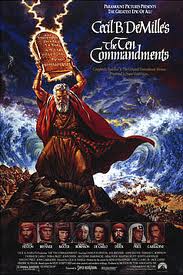 After Moses led the people of Israel out of Egypt they went to Mount Sinai where Moses receives from YHWH the Fourteen Commandments. I know what you’re thinking: “Does he know how to count?” Re-read Exodus 20:2-17 carefully and see if you don’t come up with 14 also.
After Moses led the people of Israel out of Egypt they went to Mount Sinai where Moses receives from YHWH the Fourteen Commandments. I know what you’re thinking: “Does he know how to count?” Re-read Exodus 20:2-17 carefully and see if you don’t come up with 14 also.
Traditionally, the 14 commands are divided into 4 commandments that focus on “loving” God (Exo. 20:2-11) and 6 commandments that focus on “loving” humans (Exo. 20:12-17) for a total of 10. In the first section focusing on God, the English phrase “You shall…” is repeated 6 times (all imperfects in Hebrew). The command “Remember the Sabbath day” is unique (an infinitive absolute in Hebrew). So there are 7 commands in Exo. 20:2-11 in a six and one pattern. (The two other verbs in 20:9, “you shall labor and do all your work” appear to be descriptive, not prescriptive, and therefore aren’t interpreted as commands.)
In the second section focusing on other humans, the English phrase “You shall” is repeated 6 times (all imperfects in Hebrew). The command to “Honor your father and your mother” is unique (an imperative in Hebrew). So there are 7 commands in Exo. 20:12-17 also in a six and one pattern.
(Don’t read this paragraph unless you’re into details. How did the Fourteen Commandments become the Ten Commandments? Good question. Several texts from the Pentateuch call them literally “the ten words” (Exo. 34:28; Deut. 4:13; 10:4), so that’s where the number 10 comes from. But we still need to decide how to make the 14 into 10 and this is where Christians disagree. People agree that the 3 commands in verses 8-11 are all part of the command to “Remember the Sabbath.” The disagreement centers on the beginning and the end. Most Protestants think the 2nd commandment entails verses 4-6, while the Catholics and the Lutherans think the 1st commandment includes verses 3-6. The Catholics and Lutherans then divide the two commands about coveting into #9 and #10. For more details see, http://en.wikipedia.org/wiki/Ten_commandments.)
I call them The Fourteen Commandments, not only to be provocative, but also to highlight the textual emphasis on Sabbath. A pattern of 6 and 1 in the God-commandments, then a pattern of 6 and 1 in the Human-commandments. Even in the covenantal laws given to his people, God reminds them to rest, remember the Sabbath and enjoy his creation.
Which is better, DeMille’s The Ten Commandments or DreamWorks’ The Prince of Egypt?
